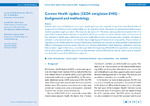German Health Update (GEDA 2019/2020-EHIS) – Background and methodology
Allen, Jennifer
Born, Sabine
Damerow, Stefan
Kuhnert, Ronny
Lemcke, Johannes
Müller, Anja
Weihrauch, Tim
Wetzstein, Matthias
Between April 2019 and September 2020, 23,001 people aged 15 or over responded to questions about their health and living conditions for the German Health Update (GEDA 2019/2020-EHIS). The results are representative of the German resident population aged 15 or above. The response rate was 21.6%. The study used a questionnaire based on the third wave of the European Health Interview Survey (EHIS), which was carried out in all EU member states. EHIS consists of four modules on health status, health care provision, health determinants, and socioeconomic variables. The data are collected in a harmonised manner and therefore have a high degree of international comparability. They constitute an important source of information for European health policy and health reporting and are made available by the Statistical Office of the European Union (Eurostat). They also form the basis of the Federal Health Reporting undertaken in Germany. Data collection began in April 2019, just under a year before the beginning of the SARS-CoV-2 pandemic, and continued into its initial phase, as of March 2020. As such, data from the current GEDA wave can also be used to conduct research into the health impact of the SARS-CoV-2 pandemic.
Dateien zu dieser Publikation

